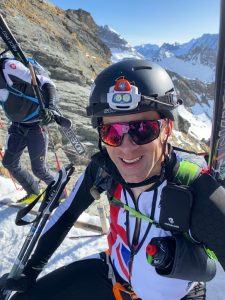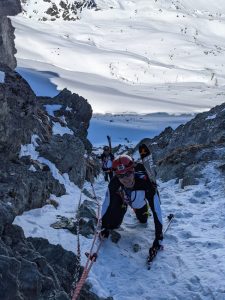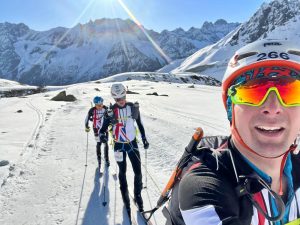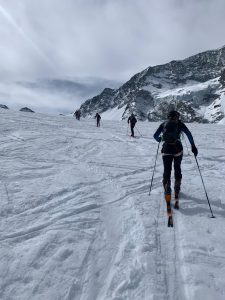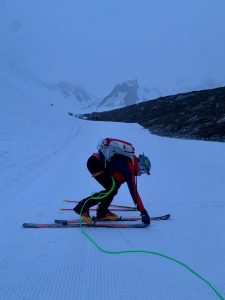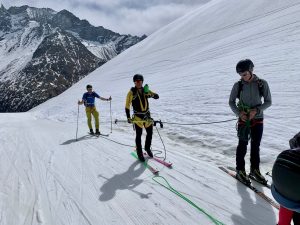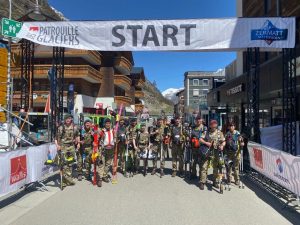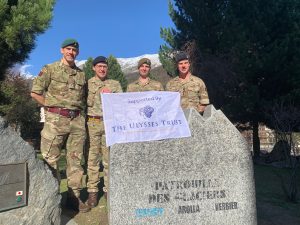Ex SKIMO WARRIOR Ulysses Trust Report ID 2859.
In April 2022, a 16 strong military team trained for and conducted a ski mountaineering expedition across the Swiss mountains from Zermatt to Verbier, also known as the Patrouille des Glaciers.
As background to what this activity involved: the Patrol Race is mildly comparable to a trail ultramarathon, on skis, on glaciated terrain, at night, at altitude, whilst roped up to your team mates! A gruelling 60km distance, with over 4000m of elevation, and taking place in the of the Valais mountain range, Switzerland. The British Army/Royal Navy entered an impressive five teams into the event (Defence’s highest contribution yet), and although faced with some challenging poor snow conditions, we had great results with all participants developing both personally and physically during the event.
Background. The adventurous training built on the success of the 2019 season before it came to an untimely halt due to the COVID pandemic. The organisers planned a bigger and better exercise for the comeback season, which involved early season training in France in February, following by continuation training then racing in Switzerland in April. Ex SKIMO WARRIOR comprises of two phases, firstly focusing on ski mountaineering training, and secondly competing in the pinnacle race of the world ski mountaineering calendar.
Phase 1. Continuation training in Arolla, Switzerland. The team was blessed with radiant sunshine as they developed their technical skills: gaining ascent, kick turns, transitions and skating. Back in the mountains at altitude helped increase stamina, endurance and speed with the aim of achieving 700-1200m of ascent over 15-20km each day using a skimo racing platform. In the evenings, briefs were delivered on mountaincraft, crevasse rescue and avalanches from both the instructors and more experienced participants. These topics enriched the physically training during the day and helped increased shared awareness of mountain hazards.
Later in the week, rope work was introduced as a new skill by a JSMTC instructor. This is required as a safety measure when travelling over glaciated terrain, both up and downhill! It involves three people being roped together via their harnesses, with enough length allowing them to make turns without colliding their skis. This enabled people to spend time refining their technique and developing teamwork as communication with other members on the rope is critical.
Phase 2. The team moved to Zermatt, Switzerland where they were hosted by the Swiss Armed Forces and attended the opening ceremony of the Patrouille des Glaciers event in the church. This provided the soldiers and officers an opportunity to integrate with their international counterparts; the event saw military teams from across Europe, France, Spain, Sweden and Switzerland to name just a few! These people bonded over their mutual love of being in the mountains and ski mountaineering. The teams then snatched a few hours sleep before moving to the start line under the cover of darkness. (The event must start at night to ensure all participants are not on the glacier during the heat of the day, for safety reasons.) All five teams participated in the event and found the snow conditions and the heat challenging. The safety time cut offs meant that several of the teams were ‘timed-out’ at checkpoints, but that didn’t diminish from their enjoyment of the event and the teamwork and resilience they developed throughout.
Challenges. As with all AT planning, there are many hoops to jump through in order to get soldiers out on snow. Unsurprisingly the mountain weather was an unpredictable force, and the instructors had to do some dynamic planning to ensure that the team weren’t caught out in a mountain hut in a snowstorm. Poor snow conditions from an unseasonably warm winter/spring led to the skiing being more technical than usual. Skiers had to adapt their technique to avoid rocks and preserve the equipment.
Benefits. The Ulysses Trust support was instrumental in the success of the exercise. It meant that correct kit and equipment such as ice axes, ropes, crampons and ski skins could be provided for all participants as these are not available through the military stores system. The challenging nature of the expedition should encourage others within units to want to go outside of their comfort zones and make new relationships.
The expedition brought together soldiers and officers, regular and reserve, from a variety of backgrounds and provided them an opportunity to train and compete on challenging mountain terrain in austere conditions. It embodied the ethos of AT, developing fitness, courage and leadership.
“To be able to compete in the Patrouille des Glaciers and attend the training camp was an amazing opportunity and has turned me into a ‘skimo’ convert. Having ski toured and alpine raced previously I thought I’d be a good candidate, however, I wasn’t quite prepared for the levels of fitness, determination and technical skiing ability which skimo dictates. Skiing hard back country conditions on tiny skis and not being able to pull over and have a little rest (it’s a race after-all) was quite a learning curve. I particularly like how skimo blends the maximal physical fitness requirements with the technical aspects of skiing in the back country combined with teamwork; avalanche safety, crevasse rescue, ski maintenance etc… The lycra is a bonus too.” Lt Hill, R WELSH

